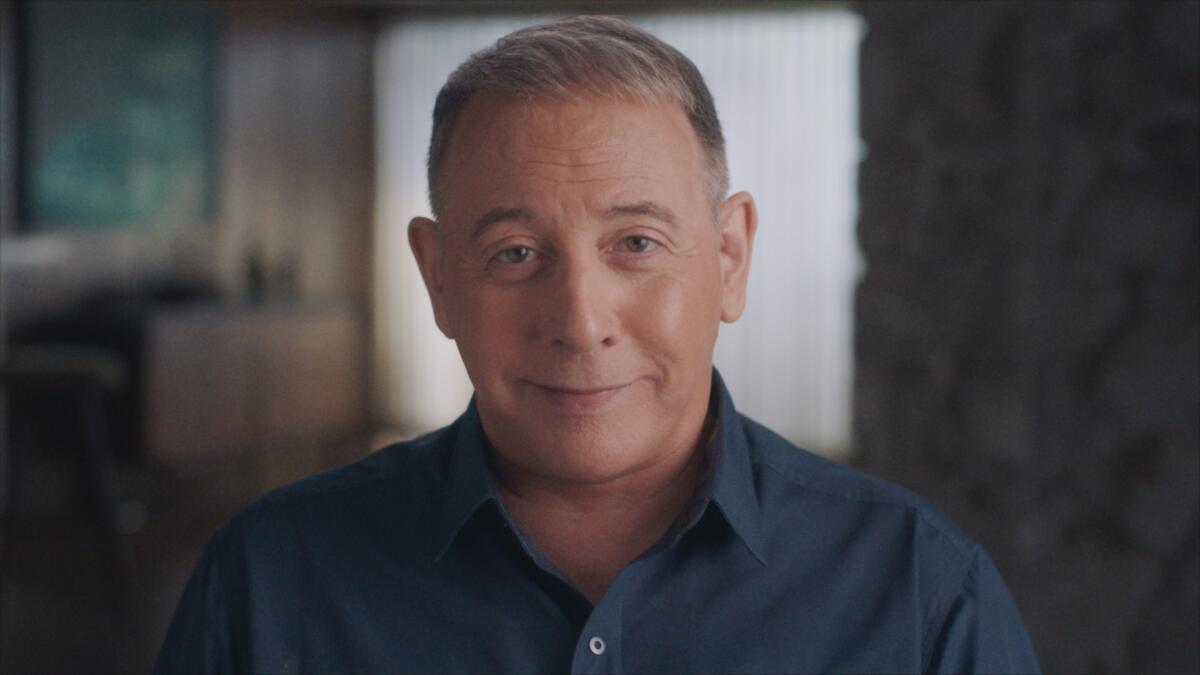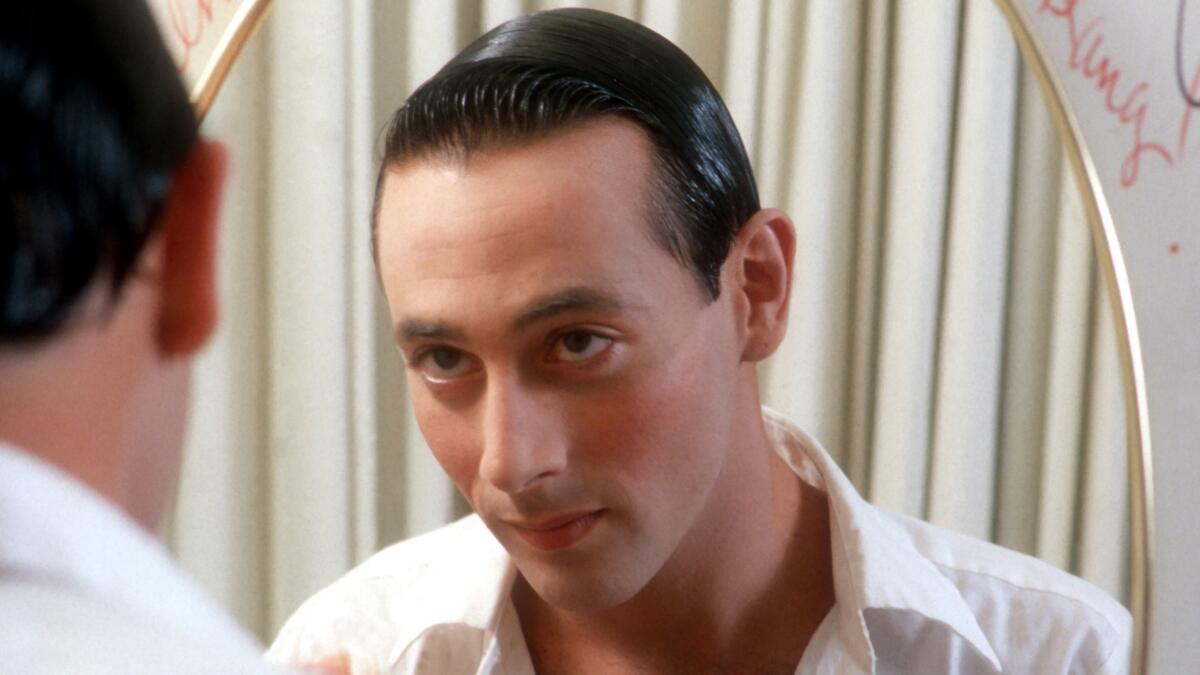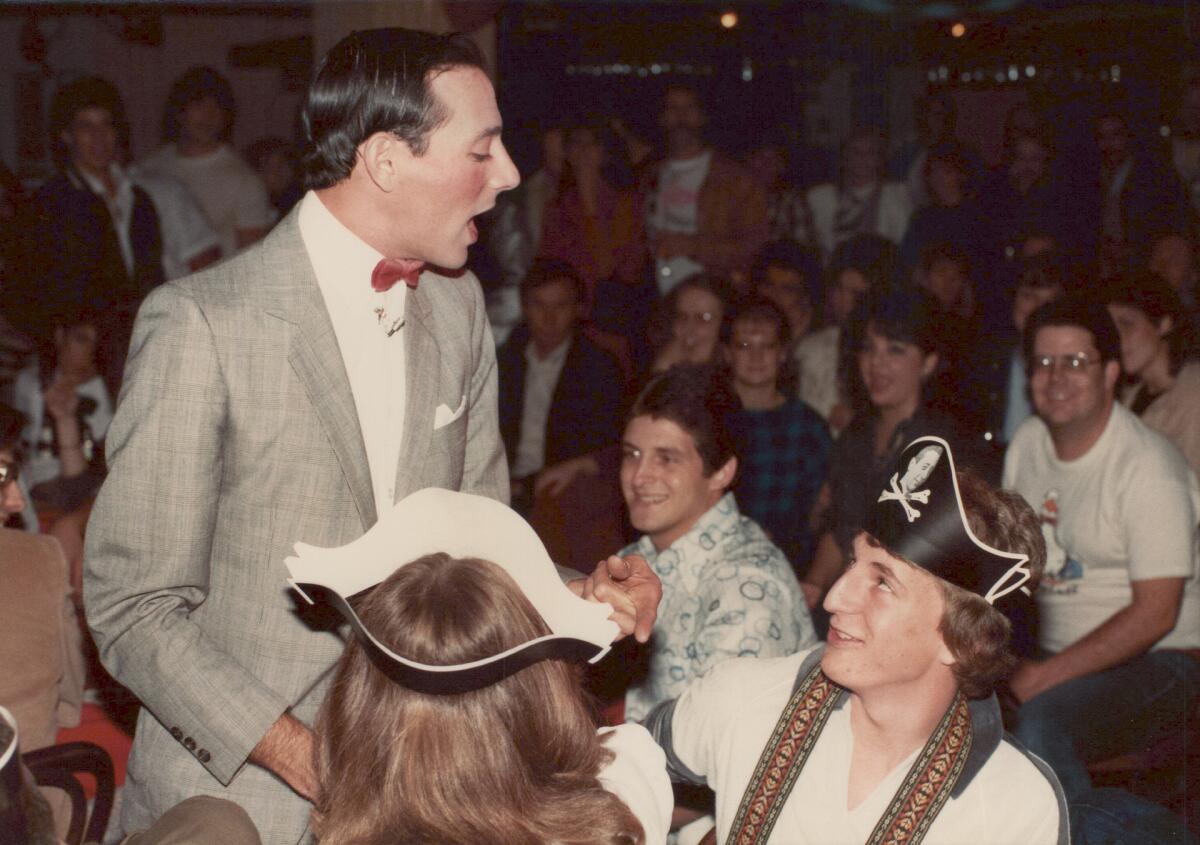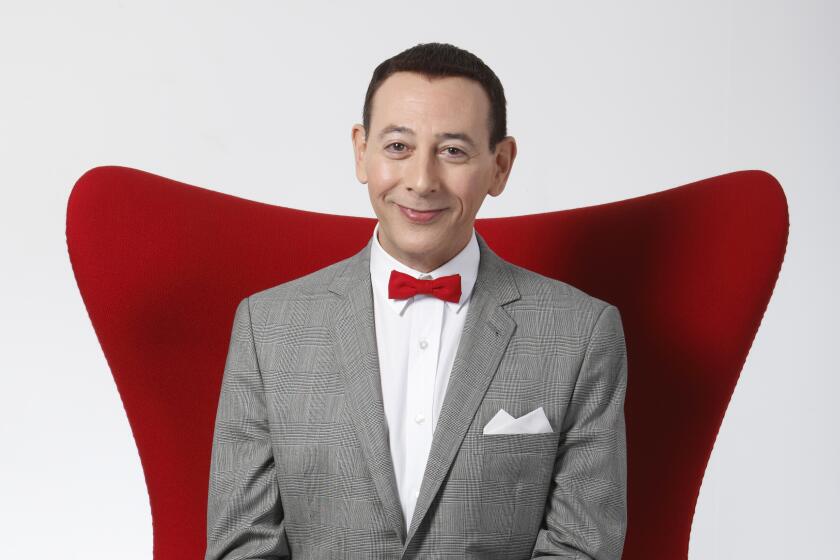‘Pee-wee as Himself’ gives Paul Reubens the final word on his identity

- Share via
“I was born in 1938 in a little house on the edge of the Mississippi River; my father worked on a steamboat and his name was Steamboat Milton,” says Paul Reubens by way of misdirection in Matt Wolf’s sideways-titled documentary epic “Pee-wee as Himself,” premiering Friday on HBO. (Pee-wee is always only himself, but Paul Reubens was often — and the only — Pee-wee Herman.)
Identity is at the heart of this story — the unresolvable relationship between the real self, the created self and the public self. He wants to “be more known,” to “explain myself,” to “answer some questions … who I really am, and what’s my story, and how did it all, like, shake down” and “to set the record straight on a couple of things, and that’s pretty much it.” It is also joyful and delightful in a way that needs no explanation because it is full of Pee-wee Herman, knocked down to rise again.
“It turns out you’re not supposed to direct your own documentary,” says Reubens, who also tells Wolf, “I feel like I’m going to come out at the other end of this process and be like, tch, I told everybody, I could have directed this documentary.”
‘Pee-wee as Himself,’ a two-part documentary directed by Matt Wolf premiering Friday on HBO, supplies a vivid portrait of Paul Reubens, who receded behind his character.
Unknown to Wolf, Reubens, who sat for 40 hours of interviews before withdrawing from the project for unstated reasons in the film, had been sick with a blood cancer for six years. (He died in 2023.) But the subject offers some foreshadowing. “This is such a dumb thing to say, but death is so final that to be able to get your message in at the last minute, or at some point, is incredible.”
Whose film is it anyway? Control is a recurring theme, as it regards his work but also his person and what he would and wouldn’t show the world. First he decided to abandon all his other comedy characters — he had several — to concentrate on Pee-wee, and then to retreat into the character, conducting his public business exclusively in costume. He had already determined, in the service of his career, to hide the fact that he was gay, and walked away from a relationship that was making him feel too settled: “I was as out as you could be, and then I went back in the closet. I could pass.” (There would be “many, many secretive relationships.”) These were different times, at least for an actor looking for mainstream success.

Reubens can look like an uncooperative subject — though no subject who sits for 40 hours of interviews can really be said to be uncooperative — and there is a certain puckishness, or Pee-wee-ness, in his fencing with Wolf: “I think really if you don’t agree with me then you’re wrong — no, I don’t really think that — all right, maybe I do think that a little bit — no, I don’t, I’m kidding. Or am I? I don’t know. I don’t know if I’m kidding. I know. But you don’t.”
And he does make a point. While many celebrity documentaries are innocuous self-celebrations produced by the subjects or by their estates, in a more open arrangement, the person behind the camera may have leave to form and express their own ideas about the person in front of it. And though “Pee-wee as Himself” is rich and respectful, it is, like any such slice of life, also selective — edited and ordered, shaped to an end: “I feel like it’s very easy to turn my story into, ‘I’m a victim’ in some way or ‘I’m the man behind the mask, the tears of a clown’ … I don’t want it to be that.”
Wolf has not made that movie, and though he might have left such comments out of the film — and while it’s possible to make too much of them, or to take seriously what’s meant ironically — they do fill out the portrait, interestingly.
Paul Reubens, the actor best known for portraying the character Pee-wee Herman before arrests temporarily derailed his career, has died. He was 70.
The bulk of it, of course, is illustrated history, framed by remarks from Reubens and his colleagues, co-stars, family and friends. It’s the story of a person driven to make a show of himself — from circus camp and performances with Sarasota’s Asolo Repertory Theatre, to California Institute of the Arts, where Reubens let his freak flag fly (theater department classmates included Katey Sagal and David Hasselhoff — if there’s a big revelation in “Pee-wee as Himself” it’s that the Hoff went to CalArts). After graduation, the life of a young actor struggling in 1970s Hollywood led him to the Groundlings Theatre on Melrose Avenue, where he created and developed the character that would be his own making. The name comes from a brand of tiny harmonica and the last name of a kid he knew in school, and he liked it because he thought it sounded real: “If you were making up a name, wouldn’t you make up a better name than that?”
As in an old Hollywood movie where a show business career grows from stage to stage and scene to scene, “The Pee-wee Herman Show” moved up from the Groundlings to the Roxy Theatre, and then to an HBO special, as the star made appearances on David Letterman and went on a national tour at the end of which he was given the chance to make a movie. Then he was signed to make a Saturday morning kids show, the divine “Pee-wee’s Playhouse,” a colorful, chaotic bastion of diversity, inclusivity and all-around acceptance, before anyone was throwing around those words. Even if you were there for this, you might have forgotten the impact and excitement it generated. He was a cult figure, not just for some, but for everyone.

“There wasn’t really a moment in the ’80s,” says Reuben, “that it wasn’t super cool to be me.”
On the (mildly) negative side, we learn that, as a perfectionist, he could be hard to work with. That he could hold a grudge. (Of Phil Hartman, who played Captain Carl in the original “Pee-wee Herman Show” until he left for “Saturday Night Live,” Reubens says, “Good for him,” not sounding like he means it — then, self-mocking, “I’ll get my violin.”) Reubens regretted the anonymity that made Pee-wee a hit, but at the same time didn’t feel like he was properly recognized for his creative contribution to “Pee-wee’s Big Adventure,” which he co-wrote with Hartman and Michael Varhol, and notes that while Pee-wee has a star on Hollywood’s Walk of Fame, he doesn’t. (“Little bit of irony … Gives me somewhere to go.”)
And there are, unavoidably, two arrests that made a lot of headlines, and which said more about the investigators than the investigated. The first, for indecent exposure in an adult movie theater, “I lost control of my anonymity, and it was devastating.” The second, a cooked-up charge of owning child pornography, hung on a single image from Reuben’s collection of vintage erotica (out of some 30,000 examined), and was finally bumped down to a misdemeanor obscenity charge. Fans — many? most? all? — saw these arrests as special bad treatment accorded to a famous person, but, says Reubens, “30 years later, I still feel the effects all the time.”
Reubens made a recording the day before he died, which Wolf plays over shots of the actor’s garden and its animal visitors. (He had, we learn, a green thumb, and loved nature.) His voice is audibly weaker and tired than his on-camera interviews. The idea of the film, says Reubens, who was still wounded by the idea that he might be mistaken for a pedophile, “was to let people see who I really am and how painful or difficult it was to be labeled something I wasn’t … to be labeled a pariah and have people scared of you or unsure of you or untrusting, or who look at what your intentions are through some kind of filter that’s not true … I wanted people to understand that where there’s smoke, there isn’t always fire.” His whole career, he says, “was based in love and my desire to entertain and bring glee and creativity to young people, and to everyone.”
“Pee-wee as Himself” is essentially a love song, as is only proper; there’d be no reason to make the film if it weren’t. Would Reubens have liked it? Maybe yes, maybe no, quite possibly yes and no. But it’s a rewarding tour of the life and career of a person who long remained private about things that weren’t really anybody’s business, yet one day decided to talk about (some of) them, and had much to say about the things he shared with everyone.
One would hope that viewers will find in Reuben’s own life the message he beamed from the “Playhouse.” Be creative, be brave, be yourself. Not everyone will love you for it, and life will not always be easy. But how dull would the alternative be.
More to Read
The complete guide to home viewing
Get Screen Gab for everything about the TV shows and streaming movies everyone’s talking about.
You may occasionally receive promotional content from the Los Angeles Times.









